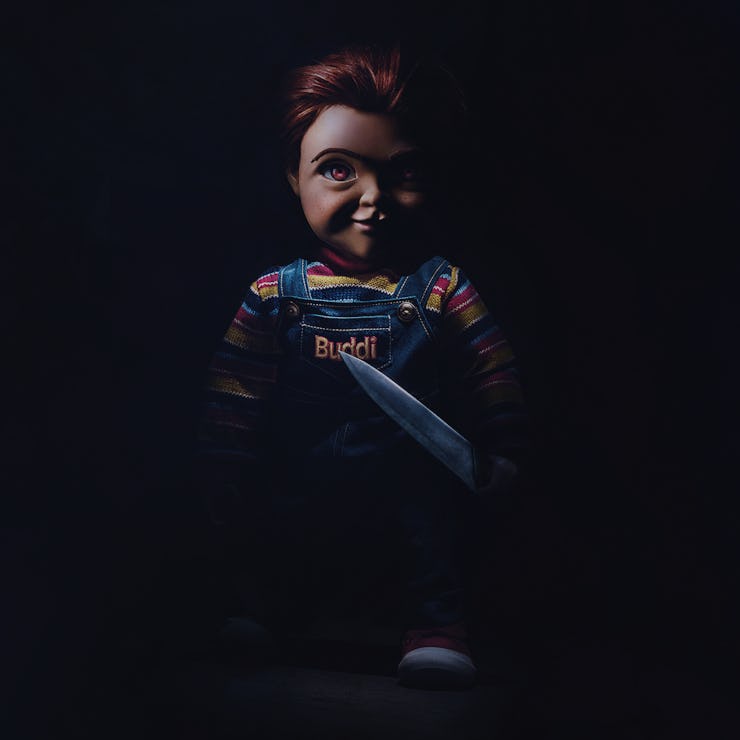'Child's Play' (2019) Director on A.I. and Black Friday: "It's Disturbing"
Lars Klevberg, the director of the 'Child's Play' reboot, expresses concerns over our "addiction" to technology and consumerism.

Lars Klevberg is not American. But in making of his reboot of the 1988 slasher film Child’s Play, the director, who hails from Norway, studied YouTube videos of an annual American nightmare: Black Friday shopping.
“It shows a side of us humans that I just think is awful,” Klevberg tells Inverse. “I think it’s disturbing to watch. When it comes to getting bad, shitty products at a low price, people will do everything they can. That makes no sense to me.”
In Child’s Play, in theaters on June 21, Klevberg reimagines Chucky — formerly a doll possessed by a serial killer — for the 21st century as a mascot of consumer greed.
"I watched a lot of Black Friday YouTube videos, and I was amazed how bad people are just to get stupid products."
Now a smart home hub kids can play with, Chucky, voiced by Mark Hamill, is a “Buddi” doll, a mascot of Kaslan Corp. (think Apple, Amazon, and Google rolled into one) with access to everything in the home (your TV, your phones, your lights, and your privacy). Buddi Dolls are the most wanted gift of the season, which Klevberg plays up in shoppers’ mad dash for the latest model.
“I watched a lot of Black Friday YouTube videos, and I was amazed how bad people are just to get stupid products,” Klevberg says. “We pay a nod to that [in the movie], the way crazy people act if they can have a new product before anyone else. It triggers something in our brain I don’t think is good at all.”
Director Lars Klevberg and cinematographer Brendan Uegama, on the set of' 'Child's Play.'
Klevberg doesn’t stop at making Chucky Wi-Fi enabled. For his film, the director explores the scary possibilities of unchecked A.I. and the darker truths about how our toys are assembled. In the reboot, Chucky’s sinister nature is the result of a disgruntled Vietnamese factory working who unlocks Chucky’s safety protocols. The employee then jumps out the window, a reference to the suicide nets outside the Longhua plant in China where Apple products are made.
Everything about Child’s Play encapsulates Klevberg’s fears of the next decade, from the rapid evolution of artificial intelligence to his horror at the conditions of consumer tech factories in Asia.
“It’s basically every product,” Klevberg says, “You get a toy from made in China or somewhere in Asia, and sitting here in our comfortable rooms, our kids play with it for five minutes and toss it away to get something new. But a lot of those toys are being manufactured in factories that have human costs.”
Adds Klevberg, “You have factories in Asia where they put up nets so if people want to jump and commit suicide, they catch them and put them back to work. We play up that absurdity. We’re eager to get the new toy but you have no idea what the human sacrifices are to create those toys. It’s this never ending loop of consumerism and human loss that I think is interesting. This is the world we’re living in.”
All the while, Klevberg is quick to admit his own participation, expressing his smartphone addiction. “You’re addicted to your iPhone because it has everything you need at a finger swipe. I share that addiction on many levels.”
Gabriel Bateman stars as Andy, with Mark Hamill as the voice of "Chucky," in the new reboot 'Child's Play.'
On A.I., which also plays a major role in Child’s Play, Klevberg predicts that it “will impact us in ways you cannot imagine.”
“Technology, in general, helps us,” he says. “It’s more positive than negative. When that technology turns against us, then I think it’s horrifying.”
It sounds like Klevberg is talking about the Terminator, but he’s actually expressing a sentiment shared by SpaceX Founder and CEO Elon Musk that “artificial intelligence is way worse than the nuclear bomb.”
“You gotta stop and hold a little to see exactly what we’re doing,” Klevberg warns. “You have China, USA, and Russia still competing to create A.I. Whoever controls A.I. controls the world. That’s how I see technology.”
Child’s Play is in theaters on June 21